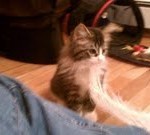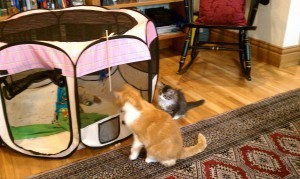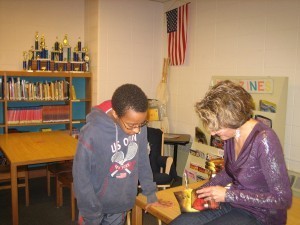Ilsa J. Bick's Blog, page 41
November 30, 2010
Kitty Kronicles
Apropos of absolutely nothing, here's a very cute video a friend's niece did. Just a nice way to end November, you know?
November 28, 2010
Love in War
So I've been thinking a lot about war lately. Part of that's because I'm working on the sequel to ASHES, and the book most definitely revolves around war against and between all kinds of enemies: the self, one's brother, the generations, the past. The other reason, though, is I just finished Sebastian Junger's War (NY: Twelve; 2010), an absolutely mesmerizing book that follows the lives of soldiers in the Korengal Valley, one of the most dangerous postings in Afghanistan. Now, I've read a lot of books about the military generally, and the Iraq-Afghanistan wars in particular. I won't go so far as to say that these wars are this generation's Vietnam; they aren't and can never be for a whole host of reasons. Part of me also thinks that branding what's happening now as a Vietnam-like experience diminishes the importance of what these wars are about and the sacrifice of those choosing to fight.
At any rate, I tore through Junger's book and then, immediately, turned back to the beginning and started to read all over again. The story is that compelling.
As it happened, I was reading the book at the same time that something really important happened. On November 16, Obama presented the Medal of Honor to Staff Sgt. Sal Guinta of the 173rd Airborne in a ceremony that CNN carried live, and which I watched.
I won't recount here, blow by blow, what Guinta did. If you don't have the patience to sit through the twenty-minute ceremony, go read Guinta's interview with Vanity Fair. Suffice to say that when Guinta's squad was ambushed on the narrow crest of a spur—at night, with no cover and on terrain bordered on all sides by steep hills and rotten rock—Guinta rescued two soldiers, putting himself into the line of fire to do so. (After pulling one wounded guy to safety, he hauled butt after two Taliban who were dragging away Guinta's badly wounded lieutenant. He killed one Taliban; after the second ran away, Guinta kept his friend alive until the platoon's medic could arrive. Sadly, the lieutenant, Josh Brennan, died in surgery a day later. )
Why is any of this important? Is this important only because Guinta was given a medal? No. Guinta himself is quick to point out that every single person in the squad deserves the same honor. Like so many soldiers, he only says that he did the job for which he'd been trained.
Really? This is only about a job?
I don't believe that. That is, yes, I believe what Guinta says, but I think the real gut-check here goes much deeper. So does Junger who, I think, really nailed it when he asked another soldier if he would risk his life for his fellow platoon-mates. That guy said he'd throw himself on a grenade because " . . . I actually love my brothers. I mean, it's a brotherhood. Being able to save their life so they can live, I think is rewarding. Any of them would do it for me."
Now, you can be cynical and say that guy and Guinta and all soldiers have been brainwashed; that the military's put them in this impossible situation and so, of course, they're conditioned to think this way—but you'd be missing the point.
I'm not going to debate the nature of war or if war is moral or any of that, but, face it: wars of all sizes happen all the time. War cuts across species. Ants go to war, and so do chimpanzees. The potential for war exists whenever individuals, human or otherwise, organize into groups, whether that group is a country, a family, a gang or friends at school.
The military's no different. Now, while I've served, I've never been in combat; the closest I came was an almost-deployment during the Persian Gulf War. But I knew many people who were deployed and I cared for many of those who returned, and I can tell you that, in an extreme situation, when people you know are going out there; when you understand that they may not come back; when you allow yourself to truly empathize with the sacrifices so many soldiers make . . . something really interesting happens. They call it esprit de corps (literally, team spirit); they call it morale. But whatever it is and no matter how you feel, personally, about going to war, when you're in uniform, you really care. The smaller the group, the more you care because in a small group, people depend on each other for survival. (Why do you think feelings are so much more intense in a family?) People in small groups, who grow to depend on one another, also grow to love each other–and love in war truly binds.
When I was in the military, my situation was nowhere near as dire as any of those on the front-line now or then. Primarily, I was worried about being deployed–my kids were very young–but I was also concerned about those already gone. I cared then and, all these years later, I still have a profound and enduring respect for soldiers—not the military establishment per se (which, trust me, has its share of jerks of all ranks), but the actual men and women who go out there to grub around and get dirty and sacrifice and bleed and fight. You might even call what I feel affection. I wasn't in the military all that long—only four years—and I left primarily because I couldn't see how I could both do my job, which would have entailed a remote tour or two, and be around for my children. I won't make excuses for my decision; I did what I thought was right based on where I was in my life as a mom and a doctor. (I remember that my sister-in-law pointed out that me being around for my children was just as important a service as putting on that uniform. She was right.) But I still wonder what might have happened if I'd stayed in, and there are lots of days when I wonder if there's not something more that I can do to help in some more tangible way: when I think I'd re-up if I could (I can't; I'm too bloody old) or volunteer. (I know the military could use my shrink skills, but the nearest base is hours away.)
Yet I continue to care—and you should, too, if for no other reason than at this time of year, when you're safe and with family, those soldiers aren't.
So, if you don't know anything, educate yourself. Start small. Read Guinta's interview. If that inspires you to read Junger's book, of which Guinta's story is only one story out of many, do. (Ideally, do both.) Then make some time to watch Junger's documentary, "Restropo," airing tonight on National Geographic.
If any of that inspires you to read and learn more, do so.
Oh, and visit Any Soldier. Make a donation; send a care package. Believe it or not, Beanie Babies are big: easy for soldiers to carry and give to local kids who, apparently, love them. So are CDs, DVDs (TV series are big), books, snacks (jerky's especially good) and personal hygiene supplies. Socks, too, only make them good ones: these soldiers are on their feet a lot. Or, if you wish, visit Brendan O'Byrne's site to learn how to send a care package; O'Byrne was with Second Platoon in the Korengal at the same time Junger was.
Whatever you do, bottom line?
Make some time to care.
November 15, 2010
Harry Potter & The Elements
A bit of Monday Morning Silliness: a little fru-fru post because I happened to stumble by Fuse #8 this morning. Now I LOVE Tom Lehrer and own all the original records (yes, vinyl). I was going to use this song for a different post, but now I figure, heck, you can hear both versions. Enjoy, and thanks to both Fuse #8 and Bookshelves of Doom for the Radcliffe link.
And for a bit of extra fun:
Now my math teachers know why I always looked so befuddled . . .
November 14, 2010
Kitty Kronicles & Weekly Mashup
Well, it's been a quiet week in Lake Woe– . . .
Oh no, wait a minute. Not only isn't that my line, I'm in Wisconsin and the week's been anything but quiet. Yeah, I finally finished the outline for SHADOWS, the second book in my upcoming ASHES trilogy, but the week has kind of been like this:
Now, neither of those are my cats, but you get the general drift. The house has been kind of busy. Not only has the little stinker sucked up a lot of time and attention–which I expected–I'd forgotten the amount of trouble a two-pound ball of fluff can get into. Nothing's broken yet and I've only had to drag him away from electrical cords ten times instead of twenty (what is it about cords and cats?). After the tenth time, I finally wised up and started using the special stinky spray that keeps cats from doing stupid things like trying to electrocute themselves. But I still haven't figured out how to keep one of my older ladies out of his food–or him out of theirs. In fact, Hubby says he finds it kind of amazing I can't outsmart animals with brains the size of a walnut. Which would probably sting if there wasn't some truth to it.
But the kitten is turning out to be one really cute little guy. In fact, he's sprawled across my keyboard right now, napping–er, supervising.
And, really, who could resist a little guy who sucks his tummy hair to get to sleep?
Now if I can just figure out how to help my calico. She really belongs to my youngest daughter; they adore each other. Me, the cat only tolerates. Oh, she's all lovey-lovey when I do what SHE wants–come upstairs, turn on the tap so she can drink from the faucet, play with her favorite feather, lie down so she can sprawl on my chest–but she's not a buddy. Won't set a paw in my office unless there's a vacuum cleaner on somewhere and then it's mainly to complain.
And, oh boy, does she HATE competition. This cat has despised every other cat who's wandered through in the last eight years, and she hates the little guy something fierce. Just pitches a fit. The growling, the hissing, the yowling, the attack modes . . . what a drama queen. She's bad enough that Hubby and I have started calling her The Evil One, Blessed be She. (You have to be Jewish to get it.)
My other girl is pretty mellow. She and the little stinker have gotten to the touching-noses stage and she tolerates him when she's not ignoring him.
So, that's kind of been my week: working, chasing the kitten . . . oh, and how could I have forgotten my book launch party? The ladies at the local library have been FABULOUS; I can't say enough good things about them. These folks always go the extra mile to get books, even if that means buying them knowing that I'll probably be the only one patron to use them. (Although the head librarian is a little peeved that the librarian in Draw the Dark is, well, kind of a witch. I keep telling her that it's fiction . . .)
Anyway, the head librarian, Erin, threw the party and it was great. Went on way over time and shut the place down, and everyone walked away with a book. (And, yes––more than two people showed.)
Honestly, though? I don't think people came to hear me. I think they came to eat a couple of these scrumptious chocolate cupcakes, courtesy of a very talent local pastry chef who hand-painted every single barn. (And thanks to Jacqueline Houhtman whose cupcake-periodic table made me green enough with envy to try something similar.)
Oh, and yeah: the symphony chorus sang last night. Okay, back up . . . I'm in the local symphony chorus (lyric soprano, and while I might be a bit of a drama queen myself, I'm no diva). The chorus's big concert for this part of the season won't be until December when we do our annual Christmas concert, but we helped out the symphony last night with a fun piece: "Bravo Morricone!" arranged by Jonathan Schwabe, a professor at the University of Iowa. If you've ever seen one of Sergio Leone's spaghetti westerns, then you've heard Ennio Morricone's work. Recognize this from A Fistful of Dollars?
Schwabe's piece is based on Morricone's score for the 1986 film, The Mission. Yeah, the trailer's a little dated, but this is a great movie, with strong performances by both Robert DeNiro and Jeremy Irons, and the music's just so sumptuous.
Anyway, last night marked only the third time Schwabe's arrangement has been heard, and I think we crushed it, I really do. I'll have a nice MP3 of the performance as soon as they do the concert CD but, in the meantime, you can listen to a brief snippet here. The clip is the third one down.
Okay, I'm off to play with the kitten (oh, how horrible). I'll leave you with this recording of the prologue to Boito's Mefistofele, which we performed in May, 2009. This is a brooding, very atmospheric piece that really blows your hair back. So, if you can get past that tiny little trumpet blat a few measures from the end . . . well, I don't think we were too shabby: Prologue from Mefistofele
November 9, 2010
My New Writing Buddy
This past weekend, I was wandering through an exhibit of Norman Rockwell paintings and drawings at the National Museum of American Art and while I liked the paintings just fine, one photograph really caught my eye: of Rockwell working at his easel, with his dog sacked out on the floor. Just my luck, I've Googled a few times but haven't been able to find the picture–but trust me: you could tell that dog was Rockwell's painting buddy.
I have writing buddies. Cats, mostly, although I've had a fair number of varmits over the years: a dog, a couple newts, some albino African frogs, so many hamsters they could double as tribbles and, of course, fish. Left to my own devices, I'd fill the house with all sorts of creatures, but then my husband would divorce me, so that's a non-starter. But I've always had that one special cat for my writing buddy: the little guy–and it's always a guy–who just hangs out as I work.
I lost my most recent writing buddy about a month ago, and I've had a pretty rough time, really missing the little guy. (My two remaining cats–both girls–are thrilled, though; the calico never did like him–then, again, she doesn't like anybody horning in on her territory–and my orange tabby only just tolerated him.) I was going to wait for a few more months before getting another little guy, but I made the mistake of visiting the local humane society about a week ago–and found just the cutest boy. Thought about it for a couple days, visited a few more times and, well, we bonded. Or, rather, I bonded: the kitten's only two months old; it barely knows it's alive yet. But he is the sweetest little purr-bug, and I brought him home today and we've been playing up a storm.





Right now, he's hanging out in the bathroom where I'll keep him separated from the ladies for a couple days; as one of my friends said, the little guy needs to decide he wants to be around us people. Then I have to figure a way where my calico–we call her The Evil One, Blessed Be She–doesn't try to kill him. (I'm serious; she is one nasty little bugger. Of course, I love her but . . . gee whiz, get over yourself already.)
Until then, I also have to decide if I like his name: Winslow. He sort of looks like a Winslow, I guess, and it does suit him. I don't know; I'll have to think on it–unless someone else has some better ideas.
Now if I can just stop playing with the little boy and get some work done 
November 8, 2010
Books Worth a Listen
One of the saving graces of traveling is time to read--and listen. I love a good audiobook. So, while I know that you're all BREATHLESSLY waiting for my next real blog entry, check out some of my favorite Audible listens:
http://www.audible.com/mc/Ilsa_Bick
November 2, 2010
Truth in Fiction
On both Fuse #8 and Liz's site, there are fabulous and fruitful discussions going on about authenticity and what obligations, if any, writers or reviewers have in terms of ensuring a narrative's authenticity–and, darn them, they got me thinking about that. Eventually, I opened my big mouth and posted a comment that I'm also posting here because, well, you know, I spent a lot of time thinking about this (which means that both Liz and Betsy did their jobs extremely well) and if I spend that kind of time, you should, too.
Really, it seems to me that what they're talking about is that unspoken contract formed between writers and readers that has everything to do with trust: what a reader brings to a book before she even cracks the spine, and what keeps faith in a narrative, or destroys it.
So, what follows below is my response to Liz–and it's not supposed to be either the final word or even all-inclusive because there are only so many hours in the day, and I got books to write. Feel free to put in your two cents, or travel on over to either Betsy's or Liz's site and enter the discussion.
* * *
Now, I'm probably not going to explain this well–which is kind of a kicker, considering that I'm both a writer AND a child psychiatrist–but you bring up some great points, ones that got me thinking about what engenders a reader's *trust*–because that's what feelings of authenticity are. Do I, the reader, trust you, the writer, in our unspoken contract to deliver a narrative I feel is true? What is authentic is not necessarily the *same* as what is true, but if truths (read: facts) are used in a narrative then they must work to foster a reader's trust in the story.
Honestly, it seems to me that feelings of authenticity are directly related to how much the book grabbed you. Period. As with your example about New Jersey and gas (thanks for that, btw; I'll remember that if I ever set a contemporary YA in NJ–although my husband's from NJ and I married him anyway): you know about NJ gas stations. You would know that this is a factual error. The question is whether or not the error is enough to kick you out of the story or influence your judgment as to how good the story is. In other words, do you lose trust in the narrative?
I can't tell you how many times I've read books that feature child psychiatrists or doctors or scientists or hikers or survivalists or climbers or, for that matter, divers . . . and there's almost always something that rises up from the page and smacks me a good one because I KNOW when the facts aren't quite up to snuff. Sometimes, that's enough to destroy the story; I'll pitch that sucker across the room because I'll be darned if I waste my time. (Psychotic, incompetent, cross-dressing, and/or homicidal shrinks almost always make me cringe. Really, most of us have gotten *so* much better . . .)
At other times, though, I'll re-read the passage to make sure I really read what I read and then, usually, one of two things happen: either I'll kind of shrug and move on because the story's pretty darned good, or I'll roll my eyes and continue on but with a heightened sense of okay-prove-to-me-that-I-should-keep-putting-effort-into-this. If the author makes a couple more boo-boos, then I give up because, really, if you don't care to get your facts straight, bub, I don't care to waste my time. I don't *trust* you any more. In those instances, my doubts about a writer's trustworthiness color everything I read.
But writers do make stuff up for a living, and I think readers have to bear that in mind. By definition, there's only so much research you can really do and I guarantee you that if I wrote a book centered on a women's prison or juvenile detention facility, someone will think I musta made that up. (Uh . . . that would be no; I've had a ton of personal experience working in those arenas. Remind me to tell you the one about a certain toe tag . . .) But I might not craft a story well enough to make you trust me, and so you'll feel my work is inauthentic when, no, no, that really happened.
Further, feelings of inauthenticity are also directly related to expectation: what people *think* that, say, autism ought to be like . . . but how are those perceptions built? Through experience? Exposure through various media? Another book that you think "did it" particularly well? Or, as Charlotte wrote, something unconscious (even fantasies of what something "should" be like)?
The other thing is that authenticity in some branches of fiction is easier to create and sustain than others. I'm thinking of, for example, historicals. I once read a book–a bestseller, by the way–where Cleopatra used a fork. Uh . . . what? WHAT? At the time I didn't know diddly about forks, but that was enough to throw me because I had a dim-enough understanding of utensils to figure, whoa, that's not right. So I looked it up and found that forks weren't invented until the 11th century or thereabouts–and that gave me pause in terms of the rest of the book. I mean, honestly, if *I* can figure this out with a few minutes' effort, why can't the writer? The story wasn't bad–it was actually quite good–but I began to doubt the rest of the historical detail. I think I even got a little pissed–like, do your homework, bub–and this from a woman who grew up devouring science fiction where all bets are off. I no longer trusted the writer.
So, in the end, you know . . . a story is fiction; fiction isn't necessarily about what is true (that's why it's fiction); but facts in fiction generally *are* supposed to be true and truth is directly related to a reader's sense of a fiction's authenticity: the degree to which you abandon yourself and trust in the writer. Me, I think that's mostly about story and how well a narrative is crafted: have you grabbed me; have you held me; and can I stay buckled in regardless of the speed bumps? Will I forgive you a couple of mistakes? If I can, then the story is true enough to and for me, and I will trust the writer. If inaccuracies foster enough doubt, well, then . . . you broke our contract, and them's the breaks.
If that's clear . . .
October 31, 2010
Oh, and one more thing
And speaking of listens, HOW could I have forgotten that seventy-two years ago yesterday–on October 30, 1938–Orson Welles and the Mercury Theater of the Air terrorized America with this splendid radio adaptation of War of the Worlds?
I first heard this in the 5th or 6th grade (I had a series of marvelous English teachers). Happily for us, there's YouTube. Enjoy this first of six parts:
October 2010 Recommended Reads, Listens . . . and Looks
I am in love with my portable DVD player. Seriously. Not only has that little, relatively inexpensive piece of tech saved me from soul-sucking, gym-induced, elliptical/stairmaster/treadmill insanity, it has reminded me, yet again, of how well some movies work when it comes to story.
Stephen King, surely the greatest storyteller on the planet, said something really cool recently : regardless of medium, it's the story that matters. (Sort of along the line of "it's the economy, stupid.") People have been telling stories for about as long as people have been around and in ever-evolving ways: from prehistoric petroglyphs and tales around the campfire to story quilts, books, plays, music, art . . . you name it. Regardless of medium and delivery, the bottom line is people want–and probably need–stories.
So you'll notice that, this month, I've included a new category: recommended looks–as in movies. (Actually, if I were playing the proper scholar, I'd be drinking chablis and calling them "films." Movies are for the masses, but films are for critics and PhDs.) Now, part of the reason I'm throwing in movies is because I like them; I really, really do. Part of the fun of doing a masters in film (actually, the swank term was a masters in "liberal studies," which was code for study-whatever-the-hell-you-want-so-long-as-it's-not-science) was that when I started out, film studies was still a fairly new discipline. I remember one of my teachers saying the field was so wide open, you could carve out a little niche for yourself using just about any applied discipline–which I promptly did by drawing on my knowledge of psychoanalysis, then the stuff of my daily life. (No, no, I wasn't the first or the best or the most influential or anything; I just put in my two cents.) For me, part of the fun of studying film was because I wanted to figure out how a movie got me to cry or laugh or root for the good guy and boo the bad one (or vice versa): to understand not only the mechanics of a movie (things like music and angles and all that techie stuff) but the themes a movie or television show plays with to suck you into the story.
I don't do that anymore. My goodness, now that I think about it, the last essay I wrote was actually a piece with this weighty title: "The Trauma is Out There: Historical Disjunctions and the PostTraumatic Narrative as Process in The X-Files." Gee, I only now remembered that essay and that's, what? Eleven years old? Holy smokes. I got to update my resumé.
Anyway, I promise nothing that unwieldy here (although, you know, that essay isn't half-bad; it's even comprehensible). What I figure is that since I really do like movies and movies deliver stories in a way that is altogether different from reading or listening to a book (or looking at a painting, for that matter) . . . why not share the love?
So, October: kind of an interesting month. I was hip-deep in the mark-up for ASHES and I think that affected my choices as well as how much time I actually had to read which was, really, never enough. As with September, though, I read and listened to and looked at far more than what's on the list below. One book I'd actually started a year or so before and then stopped reading because the writing style just got in the way of what seemed like a fabulous story. Tried again last month, finally, but with the same result. Rather than give up on the book, though, I switched to the audio version–and that did the trick, allowing me a different way into a wonderful book.
You'll notice a certain repetitiveness here, too, in that all these stories are dystopian narratives of one kind or another. Most are coming-of-age stories, too, where the protags, regardless of their age, grow up and discover that the aliens/enemies on the outside aren't necessarily as evil as those lurking within. Really, think about it. There are all kind of monsters and aliens out there: on the street, in your neighborhood, down the block. In the seat right next to yours at the dinner table. Read a newspaper, listen to the radio, watch CNN or visit a school playground if you don't believe me. And forget what you thought about evil. Stress people enough–through war or divorce or death or trauma–and you'd be amazed what kind of monsters–and heroes–show themselves.
Here's what I recommend:
Grant, Michael; Hunger: A Gone Novel; Katherine Tegen Books, 2009. This second installment in the GONE series finds the survivors still stuck in the FAYZ where conditions are deteriorating, fast. With their food supply nearly exhausted, the kids begin to splinter into warring factions—self-proclaimed humans against the freaks—while also battling an mind-sucking entity calling itself the Gaiaphage. Grimmer than GONE, this book pulls absolutely no punches. While good kind of triumphs, it also kind of doesn't. For teens and tweens in the market for a grim, gritty, no-holds-barred read.
Ness, Patrick, Chaos Walking: The Knife of Never Letting Go ; Audible Audio Edition/Candlewick on Brilliance Audio, 2010. This first volume of the Chaos Walking series is one I started reading not once, not twice but three times. The premise is great: a planet where men's—and animals'–thoughts are continually broadcast as Noise and women, at least so far as young Todd Hewitt is concerned, were killed by the Spackle, the indigenous species of New World. The only boy left in Prentisstown, Todd and his very engaging dog, Manchee, are forced to go on the run when Todd discovers a hole in the Noise: a Silence that then undoes all his assumptions about not only the past but the future.
I mean, really, what's not to like about a book with this great first line: The first thing you find out when yer dog leans to talk is that dogs don't got nothing much to say. Yet I really had trouble reading this book, not only because of the language (Todd is illiterate and the language itself is, as one reviewer put it, "pigdin" English) but because of the style: one that borrows from modern-day thrillers in very short, declarative sentences and choppy paragraphs (frequently as few as three words). I just found it tough to settle into a nice, comfortable read–and believe me, I tried.
So I put the book aside. Picked it up a couple times; put it aside again. I even tried again while in Heathrow waiting on a connection (Ness is a British author and the book had just come out in paperback.) That was a no-go, too. So I had to hope that, maybe, someone would figure out how to make this into an audiobook.
My prayers were answered when Audible put out its edition at the end of September. Nick Podehl is pitch-perfect, not only as Todd but Manchee, Todd's faithful, wonderful, unforgettable dog. Podehl transformed this story into an emotional roller-coaster that had me in tears at several points. Gritty and heart-rending, this is another grim story. And be you reader or listener, beware: Not only are there cliffhangers a'plenty, this book is a fabulous reminder of something people frequently overlook–that truth often comes at a terrible price. For teens 14 and up.
War of the Worlds (Steven Spielberg; 2005). I make no apologies for flat-out loving this film. Say what you will about Tom Cruise, the guy's been in some seriously fine films and this movie is no exception. Anyone familiar with Spielberg's work (and, yeah, I am so unapologetically a fan; my first publication in Cinema Journal was on E.T.) knows that this director's really interested in ordinary people confronting extraordinary crises: be those divorce, death, aliens–or the end of the world as we know it. Based oh-so-loosely on H.G. Well's 1898 novel, Spielberg's remake of Haskin's 1953 film is, in a word, fabulous: a pulse-pounding, fast-paced thriller. Tom Cruise is excellent as Ray Ferrier, a failed dad who must figure out a way to reconnect with his alienated kids while surviving an apocalypse; although Dakota Fanning had been in other, very good films (the spooky Hide and Seek, in which she played opposite Robert DeNiro, came out the same year), Rachel Ferrier is her break-out role; and a moony Justin Chadwin injects Robbie Ferrier with just the right amount of teenage rage. (And, oh, are those blue-blue eyes to die for, or what?)
Marry all that with Tim Robbins in a seriously creepy role, great direction, super special-effects and a pounding John Williams score . . . and you have the makings of a movie that make hours on the stairmaster evaporate. (Oh, and check out Ray's muscle car; I got to get me one of those.) Now, if only the gym allowed popcorn . . .
October 28, 2010
If A Blog Falls In the Forest . . .
So I went to this con in Minneapolis: KidLitCon 2010. Supposed to be for bloggers about blogging in—and this is my new word for the week—the kitlitosphere. (English is such a great and malleable language.) Why did I go, especially when Garrison Keillor just happened not to be performing at the Fitzgerald and Brett was going to be in Green Bay? (Oh, Brett, Brett . . . Don't get me started on Brett.)
Well, let me tell you why I went.
There's this great scene in Julie & Julia where Amy Adams, completely convinced that she's blogging into the great void, meekly types: Is there anyone out there reading me? But I'm sure you are, aren't you? Somebody? Anybody?
Oh boy, do I know how she feels. Most days, blogging feels as if I've channeled Ben Stein from Ferris Bueller's Day Off:
Now, why am I blogging altogether? Simple: My editor told me to, and I take direction well. (I do; just ask him.)
Here's how it started. My editor said that I should develop an online presence. Get on Facebook; join Twitter. Put up a blog. The goal, he said, was for me to join the conversation.
Hmmm. Okay. Sure. No sweat. So I put up a blog; I joined Facebook and Twitter—
And discovered something really, really important.
I didn't have the foggiest idea of what I was supposed to do or say. To whom? About what? Oh, I maundered on a bit about myself, gave some background, weighed in on a couple topics—but in the back of my head, this little voice kept yammering: You have no idea what you're doing and why should anyone care what you think, sweetheart?
I so completely angst over my blog. I really do. My blog tortures me. My blog is the digital equivalent of that zit no amount of makeup will make disappear. For me, blogging is like when a shirt tag's showing or I've gotten lipstick all over my teeth; everyone's too polite to say anything and just looks away. (Disclaimer: I always say something when I spot a tag or lipstick. I'm convinced that only another woman understands the horror, the horror . . .)
See, I want people to care—or, at the very least, let me hang around the bar and maybe chime in once in a while.
And as I write those words, I think I've just stumbled on something very important.
Blogging is community.
When you blog—or do Facebook or Twitter or jump into any other social medium—you're reaching out, trying to squeeze your way into a mash-up of a very large cocktail party. But this can be a problem if you're someone like me: pretty reserved, a little superstitious, relatively adept at putting foot in mouth, and—honestly—kind of shy. (Really. The fact that I can smile and chat? Years of practice. Hey, all that psychiatric training wasn't for nothing. I learned how to ask questions so other people would keep talking. Remind me to tell you someday about the assignment Tim Powers had us do at WOTF . . .)
Anyhoo. Seems to me that one of the keys to successful blogging is to develop the confidence—or the illusion of it at least—that would make someone at, say, a cocktail party give a damn about anything you have to say. In other words, if you don't have any confidence in what you think; if you can't listen to a conversation at a cocktail party—and really listen, not just hear—not only will no one listen to any comment you manage to slip in, they won't even hear you over the sound of the band.
The first person you must convince to care about what you say is . . . you.
Really.
So I think that was in the back of my mind heading into KidLitCon. I wanted to figure out why I should care about me. I wanted to know what—and who—the heck my blog was for. I really wanted to crash that stupid cocktail party without spilling my drink.
So, my questions: Was my blog a way to let people know about a nice review? To weigh in on the big issues of the day? To reveal my deep and abiding attachment to my new compost bin? (Don't ask.) What?
I mean, why blog? I'm serious. There's no compelling reason why anyone should visit a writer's blog unless that writer has a fan-base, people out there who've read a book or story and decide to look her up. So someone like me is blogging for a potential: a hope that, someday, someone's going to stumble on by.
Only who is that someone? Because aside from those teens who write review blogs, my zillions of potential YA fans don't read blogs. They couldn't care less. They don't use Twitter. They play around with Facebook, and they'll text their thumbs off before they'll actually do something as radical as talk on their cell—but they don't routinely visit blogs.
Which is pretty discouraging.
So I finally asked the question during the conference: as a YA writer, for whom am I blogging? Straight out, using just those words.
There was this loooonnnngggg pause.
Finally, someone said (and I paraphrase): A YA writer is blogging for the gatekeepers—i.e., teachers, parents, and librarians.
Uhm. Okay. Really? A teacher? A librarian? My . . . my mother?
Wow. I didn't know that.
So, after I digested that bit of information, I did manage to figure out a couple ways to play around with my blog, which I'll be trying out in the next couple of weeks. In the meantime, though, I figured I'd recap some of the other pearls I picked up from an audience of some 80+, very accomplished and dedicated bloggers: librarians, reviewers, pro-bloggers, mommy-bloggers, publishers, publicists, illustrators and authors. [Oh, and if you want to read a couple of very in-depth recaps, you can access comments here. For example, while I thought that the talk about various platforms was great—and, if the presenter is correct, a platform may very well dictate your audience—I don't see the value in outlining the pros and cons of, say, WordPress versus SquareSpace. Although I did find one editor's comment about LiveJournal—that it's a gated community of writers talking to other writers—very interesting. In that instance, a blogger knows pretty much exactly who her audience is.]
Similarly, while I heard a nice presentation on blog tours, I also talked with several authors who pretty much said that they'd found blog tours to be a tremendous amount of work for very little reward. (Just what I heard by asking a couple questions; don't shoot me.)
On the other hand, you could say that a blog tour is the equivalent of bar-hopping: bellying up to the bar, chatting up the regulars while staying sober and then moving on. So, if you feel that you must do a blog tour, keep in mind are that while many questions can be quite repetitive, your answers can't be. No matter how many times you've answered the same question, you've got to change up your answers. Also, you can help increase your visibility by coupling your tour to either a cause/issue (say, if you wrote a book dealing with child abuse, you might raise awareness by tying the tour to campaigns against abuse), or a charity.
But this was interesting, too: every single author I talked to said paying someone to arrange a blog tour was a waste of money. Okay, before you yell at me, remember: just repeating what I heard. I have no experience with blog tours: never done one, never got asked, hasn't occurred to me. Just so we're clear on that.
So, the pearls:
1. Self-promotion is a necessary evil. Get over it.
2. A blog is a conversation. That means if a reader makes a comment, you need to answer. Your readers are people, too. Above all else, be polite; be nice—and do respond.
3. A blogger needs to know his/her audience. In other words, audience is key—and audience changes depending on where you are in your career. What you write for fans will be different than, say, what you might write if your primary audience consists of other writers. But you must aware of who your audience is at any one time.
4. Dovetailing on that, a blogger must develop an online persona. In essence, you craft the kind of person you want your readers to see and make decisions about your posts accordingly.
5. A blog writer should be a blog reader. This turns out to be a big deal because bloggers—especially reviewers and librarians—want to know who and what you're reading. They want to know that you're serious, and you've got to demonstrate a working knowledge of other people's blogs. That's fair. You want to buy a house and fit in? Bake cookies, pick up after your dog, and get to know your neighbors.
6. In line with that, you need to develop an online presence by commenting on other blogs (which is probably what my editor meant when he said I should join the conversation). Use the Goggle Reader; comb through the blogs; make a comment here and there, not only to spread your name around but to hear/read/listen to what other people are saying—and respond in kind. Really, if you want to join a conversation, you don't just butt in with some comment about the Packers if everyone else is talking politics. Would you do that in real life? Of course not. Same thing here.
7. Develop an online presence, and blogging can make your career. This was something that Maggie Stiefvater really hammered on in her keynote. In fact, her publisher elected to start her most recent book tour over the summer instead of the fall and counted on her blog presence—which she's built up over almost a decade, starting from highlighting her art work to posting a story a week with two other writers—to bring in fans. Which it did, in droves.
8. Figure out what's not out there. This is in-line with what Maggie said at the beginning of her keynote: the world really isn't waiting for that next big blog. The world couldn't care less. So you must figure out a way not only to join in but stand out in some way, sort of like making a comment that's actually listened to versus simply chiming in with an oh yeah, like, totally.
9. Anything you write will be remembered forever. This presumes, of course, that someone reads you. But you must always behave as if someone is.
10. Blogs should be user-friendly: easy to navigate, self-explanatory, tidy.
11. For YA and kid authors, in particular, there are ways to participate with fans that don't involve leaving your house or driving across country. For example, you can Skype into a classroom. (In fact, I talked to one librarian about doing just that.) You can do a chat. Let tech be your friend.
12. This was kind of interesting: don't make blog posts TOO long. Only dedicated, fascinated readers will persevere to the end. How long is too long? Beats me. But here's what I figure: blogging is a little bit like submitting a story to an editor. I know a couple editors who both love and hate when a writer hooks 'em because then the writer's made them spend time they haven't got, damn it. So, in a way, it seems to me that blogging is not a time for a writer to get lazy. This goes back to making readers care about what you have to say—and why blogging can also be a HUGE time-sink, which leads me to:
13. If you're not careful, blogging will take over your life. Now, no presenter actually said that; this was something I picked up by eavesdropping between panels. (Yes, I was the woman in the funky orange top pretending to be über-fascinated by that utterly incomprehensible painting you'all were standing next to . . .) As with anything else, if you're going to blog, remember that while a blog is product, it is product that no one is paying you for. Now, obviously, if you collect related posts and make a book out of them, that's not true. But, by and large, you are spending time blogging, and time is money, so budget accordingly. Think of blogging as an investment of your time and resources. A couple of coins every few days will probably yield a greater return than one huge bolus of cash.
12. And, oh yeah: If you don't think you have the time or aren't comfortable blogging, don't. Really. Your lack of enthusiasm will be all-too painfully obvious.
So, there you go: some pearls. Like I said, if you disagree with some, don't yell at me.
Okay, blog time's up. I got a book to write.
Oh, but before I forget: those kick-ass Jeffrey Campbell boots? Too big. Quelle bummér.
Now to find a size 7 in distressed brown . . .










